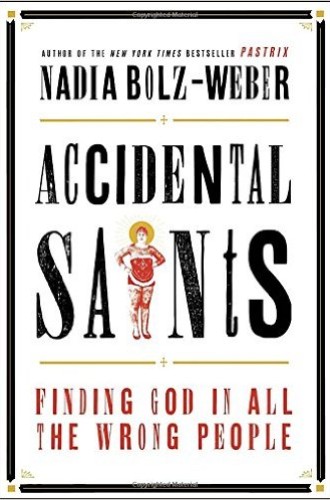Accidental Saints, by Nadia Bolz-Weber
In reading Nadia Bolz-Weber’s new book, you may pine for a church in which more preachers sound like her. A sudden desire for a well-placed expletive in Sunday’s sermon may overtake you, as may a longing for prophetic scripture interpretations in hipster patois. Whether you are pastor or parishioner, you may envy a church in which the pastor is permitted to say, “I’m not running after Jesus. Jesus is running my ass down.”
True: those of us without tatted, potty-mouthed leaders or a church that allows for them may idealize both—something Bolz-Weber writes about in Accidental Saints. After the success of her best-selling Pastrix, Bolz-Weber found herself and her Denver congregation, House for All Sinners and Saints, a center of fame and controversy. Here she waves readers away from any plans to visit her church to see what all the fuss is about.
Read our latest issue or browse back issues.
If you want a community like the one she describes, she says don’t become a hanger-on at a church like hers, supposedly filled with all the cool kids. Instead, “do what we did: Gather a small number of people . . . to simply share a meal and pray together. Talk about your lives and what is happening in the world. Be yourselves. Extend grace. Read the gospel . . . and repeat.” Like most of Bolz-Weber’s writing, those pithy sentences have a long shelf life, and their quotability index is off the charts. Perhaps we who wish our pastors were eloquent theologians with a gritty vibe can at least purchase a copy to pass on to them.
Readers who found Pastrix to be a long, cool drink from the tankard of progressive Christianity will find more of the same refreshment here. On the other hand, those who have tired of the author’s cranky schtick and eye-rolling at conventional Christianity will tire of it in this book as well. Although some of my friends are in the second camp, I’m in the first; I find Bolz-Weber’s writing so fluid and hilarious and gorgeous that I have to fight off the urge to simply string together excerpts from the book and call it a review. Bolz-Weber is one of the liveliest Christian voices out there, and this book seals the deal. Accidental Saints is wickedly funny and painfully vulnerable, theologically nuanced and lyrically sonorous. Her voice communicates the scandal of the Christ and the sacraments of his church with more force and vitality than most writers can hope to summon.
Bolz-Weber narrated her own struggles with cynicism, alcoholism, drug addiction, and promiscuity in Pastrix. Accidental Saints is no less confessional. Now that she is a pastor in the Evangelical Lutheran Church in America, her current sins are more mundane—liberal smugness, dislike of a difficult parishioner, an anger problem that propels her from “zero to batshit crazy in no time at all”—but she confesses them with no less vigor than she did those recounted in her first book. Many readers will find Accidental Saints less exotic than Pastrix, and thus more convicting.
And the thing about her church being filled with hipsters? Not true, she writes. Bolz-Weber is not unaware of her indie vibe and its tendency to attract people more interested in image than in substance. One of her strongest chapters is “The Lame,” in which she reflects on the reputation that her church has earned for being filled with smart, sarcastic people with “tattoos and ironic eyewear.” Not true, she says; the cool people tend not to stick around. She puzzled over this dynamic for several years until she had an epiphany related to the fact that she, like Whitman, contains multitudes. “The ‘cool’ part of me was never what attracted the people who stayed,” she writes. “The bug-eyed kid with no friends brought them in.”
Accidental Saints introduces us to some of the House for All parishioners and the services that constitute their life together. Organized around her congregation’s practices during the liturgical year, the book carries us from cut-out saint cookies for All Saints Day, to the Advent service of remembrance for the children killed in the Sandy Hook school shooting, to the funeral of a young gay man who committed suicide right before Lent.
She also writes about some of the rocks and hard places between which she has found herself since her stunning prose and honest stories of recovery first earned her fame. There was the time she was invited to speak to thousands of Lutheran youth at their national convention in the Superdome in New Orleans because “middle-aged people think teenagers will think I’m cool . . . likely I seem hip only to people older than me.” Or the time she booked herself to do a wedding for two parishioners in Colorado in the middle of a two-week speaking tour in Australia.
“All the saints I’ve known have been accidental ones,” Bolz-Weber writes in the first chapter, in which she recounts her congregation’s one-time practice of baking saint cookies for All Saints Day: gingerbread people decorated to look like John the Baptist and Joan of Arc and placed on a table with photographs and mementos of people loved and revered by congregants. Although her congregation gave up the baking of saint cookies after that year, her entire book is a tribute to the kind of saint she is talking about: Chloe, the manga-loving youth with pink bangs and scars from cutting herself, who helps her figure out what to say to teenagers; and Bruce, a caring bishop who drove his car while intoxicated and killed a mother of three.
Saints, Bolz-Weber writes, are “people who inadvertently stumbled into redemption like they were looking for something else at the time, people who have just a wee bit of a drinking problem and manage to get sober and help others to do the same, people who are as kind as they are hostile.”
Bolz-Weber extends the accidental quality of sainthood to spirituality itself. Recounting a Q&A in which someone asked her what she does personally “to get closer to God,” she evokes the Hound of Heaven, albeit with more disgruntlement than British poet Francis Thompson, who dreamed up the metaphor. Trying to get closer to God sounds like a horrible idea: “Half the time I wish God would leave me alone.” The quality of sainthood is located not in “our ability to be saintly,” she writes, “but rather God’s ability to work through sinners.” Rather than seeing the Beatitudes, which constitute the Gospel reading for All Saints Day, as a list of conditions for blessedness, we should see them as performative—as the “pronouncement of blessing [that] confers the blessing itself.”
It’s a compelling vision of sainthood and, by extension, of its younger sibling spirituality. This will resonate with the much-sought-after demographic of the nones and dones, as well as with more churchy folks who are weary of earnest and dogmatic evangelical spirituality. But unhitching sainthood from self-denial, spiritual devotedness, and the pursuit of godly living is a peculiarly American and late modern move. Its emphasis on inclusivity and freedom—“my congregation is free to live as Christians in a way that makes sense for us,” she writes at one point—combined with a downplaying of piety and behavior, means that pretty much anyone who has helped out someone else or stood up for truth and justice deserves the moniker saint. That definition may sound good to those of us who live self-centered lives with a few random upticks of kindness, but when does a category become so roomy that it ceases to mean anything?
The brand of faith that imbues Accidental Saints works well as corrective, antidote, and push back. But in two or three generations, if this populist definition of sainthood wins out over the one that emphasizes exemplary devotion and likeness to God, will terms like holiness and godliness go extinct? If they do, will it matter?
Perhaps these are wearisomely predictable concerns coming from a Mennonite schooled in the imperatives of discipleship. I’m also in that notoriously conservative era of the lifespan: raising children on the cusp of adolescence, when we hug tightly to whatever theological flotsam might get us and our kids through the waters of endless religious and ethical choice. As a reader and a progressive Christian, I lap up Bolz-Weber’s words. As a parent concerned about the transmission of faith and wanting my children to be spared the profound consequences of bad choices, I think tame and respectable sound just fine, thank you very much. I’m sure there’s some road between the pharisaical faith that Bolz-Weber critiques and the addictions and promiscuities that persuade one of divine grace. Stepping back from my enthrallment with Bolz-Weber’s prose, however, I’m not sure her theology gets us there.
We are speaking of the age-old volley between works and grace, of course—between authority and freedom, pursuit of God and pursuit by God. And maybe this critique boils down to a question of degree, or relative emphasis, about which Mennonites and Lutherans have squabbled for years. For all Bolz-Weber’s pooh-poohing of evangelical spirituality—“I honestly can’t think of what practices I do that help me become more spiritual,” she writes at one point—she stakes her tent in the religious life. And her version of faith constitutes a high bar: “a life bound by ritual and community, by repetition, by work, by giving and receiving, by mandated grace.” Frankly, that definition of the life of faith sounds like one via which a person becomes closer to God, the aim that she assails a few chapters earlier. So while she and her congregation pride themselves on being “religious but not spiritual”—a charming inversion of the nones’ mantra—the phrase may reinforce a false dichotomy rather than collapse it.
Despite these theological quibbles, I’d like to hand a copy of Accidental Saints to every leader in my own denomination, torn apart as so many are these days by our inability to extend grace to one another. Although Bolz-Weber’s style wouldn’t work for every congregation, her metaphor for leadership will bring relief for clergy, even those without tattoos, who find themselves in the jam of church conflict and pressured to lead with their strength rather than their weakness. “Yeah, I am a leader,” she writes, “but I’m leading them onto the street to get hit by the speeding bus of confession and absolution, sins and sainthood, death and resurrection—that is, the gospel of Jesus Christ. I’m a leader, but only by saying, ‘Oh, screw it. I’ll go first.’”







